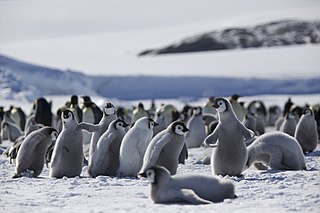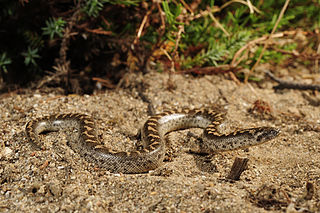Evolutionary psychology is a theoretical approach in psychology that examines cognition and behavior from a modern evolutionary perspective. It seeks to identify human psychological adaptations with regards to the ancestral problems they evolved to solve. In this framework, psychological traits and mechanisms are either functional products of natural and sexual selection or non-adaptive by-products of other adaptive traits.
Sociobiology is a field of biology that aims to explain social behavior in terms of evolution. It draws from disciplines including psychology, ethology, anthropology, evolution, zoology, archaeology, and population genetics. Within the study of human societies, sociobiology is closely allied to evolutionary anthropology, human behavioral ecology, evolutionary psychology, and sociology.

Behavioral ecology, also spelled behavioural ecology, is the study of the evolutionary basis for animal behavior due to ecological pressures. Behavioral ecology emerged from ethology after Niko Tinbergen outlined four questions to address when studying animal behaviors: What are the proximate causes, ontogeny, survival value, and phylogeny of a behavior?
In evolutionary biology, inclusive fitness is one of two metrics of evolutionary success as defined by W. D. Hamilton in 1964:

Parental investment, in evolutionary biology and evolutionary psychology, is any parental expenditure that benefits offspring. Parental investment may be performed by both males and females, females alone or males alone. Care can be provided at any stage of the offspring's life, from pre-natal to post-natal.

In ecology, r/K selection theory relates to the selection of combinations of traits in an organism that trade off between quantity and quality of offspring. The focus on either an increased quantity of offspring at the expense of individual parental investment of r-strategists, or on a reduced quantity of offspring with a corresponding increased parental investment of K-strategists, varies widely, seemingly to promote success in particular environments. The concepts of quantity or quality offspring are sometimes referred to as "cheap" or "expensive", a comment on the expendable nature of the offspring and parental commitment made. The stability of the environment can predict if many expendable offspring are made or if fewer offspring of higher quality would lead to higher reproductive success. An unstable environment would encourage the parent to make many offspring, because the likelihood of all of them surviving to adulthood is slim. In contrast, more stable environments allow parents to confidently invest in one offspring because they are more likely to survive to adulthood.

A psychological adaptation is a functional, cognitive or behavioral trait that benefits an organism in its environment. Psychological adaptations fall under the scope of evolved psychological mechanisms (EPMs), however, EPMs refer to a less restricted set. Psychological adaptations include only the functional traits that increase the fitness of an organism, while EPMs refer to any psychological mechanism that developed through the processes of evolution. These additional EPMs are the by-product traits of a species’ evolutionary development, as well as the vestigial traits that no longer benefit the species’ fitness. It can be difficult to tell whether a trait is vestigial or not, so some literature is more lenient and refers to vestigial traits as adaptations, even though they may no longer have adaptive functionality. For example, xenophobic attitudes and behaviors, some have claimed, appear to have certain EPM influences relating to disease aversion, however, in many environments these behaviors will have a detrimental effect on a person's fitness. The principles of psychological adaptation rely on Darwin's theory of evolution and are important to the fields of evolutionary psychology, biology, and cognitive science.
Life history theory (LHT) is an analytical framework designed to study the diversity of life history strategies used by different organisms throughout the world, as well as the causes and results of the variation in their life cycles. It is a theory of biological evolution that seeks to explain aspects of organisms' anatomy and behavior by reference to the way that their life histories—including their reproductive development and behaviors, post-reproductive behaviors, and lifespan —have been shaped by natural selection. A life history strategy is the "age- and stage-specific patterns" and timing of events that make up an organism's life, such as birth, weaning, maturation, death, etc. These events, notably juvenile development, age of sexual maturity, first reproduction, number of offspring and level of parental investment, senescence and death, depend on the physical and ecological environment of the organism.

Mate choice is one of the primary mechanisms under which evolution can occur. It is characterized by a "selective response by animals to particular stimuli" which can be observed as behavior. In other words, before an animal engages with a potential mate, they first evaluate various aspects of that mate which are indicative of quality—such as the resources or phenotypes they have—and evaluate whether or not those particular trait(s) are somehow beneficial to them. The evaluation will then incur a response of some sort.
Mate desertion occurs when one or both parents abandon their current offspring, and thereby reduce or stop providing parental care. Often, by deserting, a parent attempts to increase breeding opportunities by seeking out another mate. This form of mating strategy behavior is exhibited in insects, birds and mammals. Typically, males are more likely to desert, but both males and females have been observed to practice mate desertion.
In behavioral ecology, adaptive behavior is any behavior that contributes directly or indirectly to an individual's reproductive success, and is thus subject to the forces of natural selection. Examples include favoring kin in altruistic behaviors, sexual selection of the most fit mate, and defending a territory or harem from rivals.
The theoretical foundations of evolutionary psychology are the general and specific scientific theories that explain the ultimate origins of psychological traits in terms of evolution. These theories originated with Charles Darwin's work, including his speculations about the evolutionary origins of social instincts in humans. Modern evolutionary psychology, however, is possible only because of advances in evolutionary theory in the 20th century.
Evolutionary aesthetics refers to evolutionary psychology theories in which the basic aesthetic preferences of Homo sapiens are argued to have evolved in order to enhance survival and reproductive success.
Mate preferences in humans refers to why one human chooses or chooses not to mate with another human and their reasoning why. Men and women have been observed having different criteria as what makes a good or ideal mate. A potential mate's socioeconomic status has also been seen important, especially in developing areas where social status is more emphasized.

In evolutionary psychology and behavioral ecology, human mating strategies are a set of behaviors used by individuals to select, attract, and retain mates. Mating strategies overlap with reproductive strategies, which encompass a broader set of behaviors involving the timing of reproduction and the trade-off between quantity and quality of offspring.

The following outline is provided as an overview of and topical guide to evolution:
Evolutionary psychology has traditionally focused on individual-level behaviors, determined by species-typical psychological adaptations. Considerable work, though, has been done on how these adaptations shape and, ultimately govern, culture. Tooby and Cosmides (1989) argued that the mind consists of many domain-specific psychological adaptations, some of which may constrain what cultural material is learned or taught. As opposed to a domain-general cultural acquisition program, where an individual passively receives culturally-transmitted material from the group, Tooby and Cosmides (1989), among others, argue that: "the psyche evolved to generate adaptive rather than repetitive behavior, and hence critically analyzes the behavior of those surrounding it in highly structured and patterned ways, to be used as a rich source of information out of which to construct a 'private culture' or individually tailored adaptive system; in consequence, this system may or may not mirror the behavior of others in any given respect.".

Social selection is a term used with varying meanings in biology.
This glossary of genetics and evolutionary biology is a list of definitions of terms and concepts used in the study of genetics and evolutionary biology, as well as sub-disciplines and related fields, with an emphasis on classical genetics, quantitative genetics, population biology, phylogenetics, speciation, and systematics. Overlapping and related terms can be found in Glossary of cellular and molecular biology, Glossary of ecology, and Glossary of biology.
Human reproductive ecology is a subfield in evolutionary biology that is concerned with human reproductive processes and responses to ecological variables. It is based in the natural and social sciences, and is based on theory and models deriving from human and animal biology, evolutionary theory, and ecology. It is associated with fields such as evolutionary anthropology and seeks to explain human reproductive variation and adaptations. The theoretical orientation of reproductive ecology applies the theory of natural selection to reproductive behaviors, and has also been referred to as the evolutionary ecology of human reproduction.






